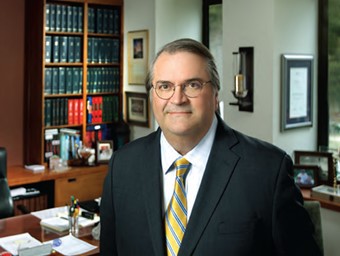In Memoriam: Alan W. Partin, M.D., Ph.D.

With great sadness, we report the passing of urologist Alan Partin, M.D., Ph.D., who succumbed to glioblastoma at the age of 62. Partin retired last year as Urologist-in-Chief of the Johns Hopkins Hospital and Jakurski Family Director of the Brady.
“Throughout his career as a clinician, scientist, and teacher, Alan was consistently at the heart of discovery and innovation in the field of urology,” says Mohamad Allaf, M.D., who succeeded Partin in 2022.
Partin came to Hopkins in 1982 after a stellar college career at the University of Mississippi. At Ole Miss, he double-majored in chemistry and mathematics, was the Valedictorian of his graduating class, played football all four years, and was named an Academic All-American football player. At Hopkins, Partin earned his M.D. and his Ph.D. in Pharmacology; during this time, he met Donald Coffey, Ph.D., the Brady’s Director of Research. Coffey became Partin’s research mentor and lifelong friend.
During Partin’s last year of medical school, he worked with Patrick Walsh, M.D., and discussed the possibility of applying for training in Urology, and Walsh suggested that he “shadow” him in his clinics. While seeing patients and discussing prostate cancer staging, Partin asked Walsh a question: “In prostate cancer, is it possible that tumor volume – rather than percent of the gland involved – would be a more accurate way to estimate tumor aggressiveness? Which is worse, a ping-pong ball inside a watermelon, or a ping-pong ball inside of a tennis ball?” Walsh, Partin later wrote, “agreed that this was a terrific question,” and they carried out a study to find out. “It turned out that the percentage of the gland involved (more or less than 5 percent) was more accurate in predicting curability than tumor volume,” Partin said.
This turned out to be the first of many clinical projects that Partin would work on with Walsh, some of which are the most cited papers in the field.
Partin was accepted for the Brady residency, where he learned meticulous surgical techniques and continued his research. The most referenced and clinically useful discovery of his career was the nomogram now known as the Partin Tables. In 1993, based on Walsh’s detailed database of his first thousand patients, Partin was able to make a pre-operative estimate of the pathologic findings at radical prostatectomy. His calculation used three simple parameters: the PSA value, the findings on rectal examination (the clinical stage), and the Gleason score on the biopsy.
“Before this discovery, it was difficult to know who might benefit most from surgery,” says Walsh, “because there was no accurate means to determine curability. However, with the Partin Tables, suddenly there was an algorithm that allowed patients and physicians to predict the probability that the cancer could be cured.” One noted medical oncologist termed the Partin Tables the “prognostic paradigm of the 1990s,” and for decades, the Partin Tables have helped patients and doctors worldwide estimate the prognosis for men with newly diagnosed prostate cancer.
In later work, Partin and his lab helped to develop several innovative tests to identify and track prostate cancer, including the Prostate Health Index (PHI) test.
After finishing residency, Partin joined the Brady faculty as an associate professor, was shortly promoted to full professor, and was honored with an endowed chair, the Bernard L. Schwartz Distinguished Professorship in Urologic Oncology. In 2004, he succeeded Walsh as the Brady’s fourth Director.
Under his leadership, the Brady doubled its research space and enjoyed significant expansion with projects such as the Greenberg Bladder Cancer Institute and new clinical space at Green Spring Station Pavilion III.
Partin contributed to more than 600 scientific articles, publications, and presentations. He served as editor of the respected journal Urology for a decade and was the recipient of many honors, including the British Association of Urological Surgeons’ distinguished St. Paul’s Medal; the American Urologic Association’s prestigious Gold Cystoscope and Distinguished Service Awards; the Ambrose Monell Research Award; the David Koch Prostate Cancer Research Award; and the Merck Young Investigator Award. He also was elected to the American Association of Genitourinary Surgeons, the world’s most distinguished urologic organization.
“Alan was a mentor, adviser, and dear friend to many of us here at the Brady and throughout the field,” says Allaf. “He is deeply missed.” Partin is survived by his wife, Vicky, their four sons and their wives, and five grandchildren, and by his brother and sister-in-law.
In 2022, with contributions from patients, friends, and family, the Alan W. Partin, M.D., Ph.D., Professorship in Urology was established to support a faculty member’s research to develop diagnostic tools and new treatments for prostate cancer.
